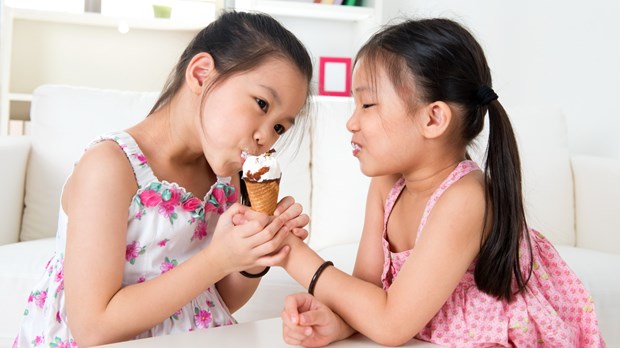How to Raise Selfless Kids in a Self-Centered World

There I sat in the midst of the crowded theater listening to the orchestra. Not my normal Saturday night routine, I'll admit. But some of my friends felt that I needed a little culture, so there I sat, getting a healthy dose of sophistication.
Occasionally throughout the performance, the conductor would motion to a man who played the violin and have him stand. The crowd applauded wildly. When I left that night, I took with me not only my newfound "culture," but a whole bunch of questions as to what made that guy so special.
And let me tell you, I got an education. Turns out that guy was Michael Davis, the first-chair violinist, or concertmaster. Next to the conductor, he was the Mac Daddy.
Shows you how much I know.
In time, Michael and I became good friends. But that first night I just saw him as the guy who got all the applause.
It's fun to be number one.
Not so much if you're second. The great conductor Leonard Bernstein was once asked, "What is the hardest instrument to play?" To which he replied, "Second fiddle. I can always get plenty of first violinists, but to find one who plays second violin with as much enthusiasm . . . now that's a problem."
I wondered if that was literally true, or just a figure of speech. So I posed the question to my talented musician friend Michael: Is it really harder to play second-chair violin in an orchestra as opposed to first-chair?
I loved his answer. "Playing the notes isn't tougher musically," Michael said, "but you're doing a lot of the work in the background while someone else is getting the glory. First violinists get the attention; that's what makes playing second violin tough."
This musical metaphor offers an apt characterization of our culture: we don't handle it well when we do the same work but someone else gets more of the glory.
Someone once said, "It's amazing what can be accomplished when no one cares who gets the credit." These words have been attributed to both the iconic UCLA basketball coach John Wooden and to NASCAR owner Robert Yates. How wonderfully ironic that we don't quite know who to give the credit to!
Whichever man said it, you and I'd do well both to live by that truth and teach it to our children. Yet this is one of the biggest challenges for us as parents: to raise kids who accept that they don't deserve first-chair treatment.
Kids whose disposition and joy are not tied to their personal opportunities, possessions, or circumstances.
Kids who go to great lengths and derive genuine joy from elevating others.
Kids who realize that their sole purpose on earth is to glorify God and honor others.
People are more important than things
Make no mistake: this transformation starts with you, the parent. If you give your smartphone more attention than you give your loved ones, don't be surprised when video games and Facebook outrank you in your child's eyes.
And don't expect society to be in your corner. Our acquisition-hungry culture equates worth with possessions and responsibilities. The more you have, the more you spend, the more you own, the more value you have in the world's eyes.
Your children will never move toward honoring others until they genuinely believe that you value people over things.
So how do you teach your kids that people are more important than things?
By believing it yourself.
By living it.
When my kids started driving, I felt prompted to assure them that they were more important than the car itself. We hope our kids know that, but a little reinforcement never hurts, especially during that first year as your teen is strangling the steering wheel with sweaty fingers. Accidents happen, and sometimes the car goes faster than we intend. So I placed in the glove compartment, clipped to the car's registration and insurance card, the following note:
If you have found this document, it means either a police officer has pulled you over, or you have been in an accident. First, I hope you are okay and that no one was hurt. But I also hope you will hear my voice saying to you, "You are more important to me than any car."
Cars can be painted and fixed. Sometimes people can't. I love you and hope you are okay. Give me a call when the cop leaves so that I will know that you are.
Love,
Dad
P.S. If you were speeding, I hope you learned your lesson. Never forget the beating of your heart when you saw the flashing lights in your rearview mirror.
(At least I've heard people say the heart rate increases. I wouldn't know!)
Those words might sound hokey, but in that tense moment the message won't seem that way to your teenager. It will communicate that you value people above things, that you value him or her above a car.
Meanwhile, back at the symphony . . .
In a symphony, just as in life, the soaring melodies and beautiful sequences go to the first violin. The audience gravitates to the musical score, pays attention, and offers accolades to the first violin. But behind the music lies the harmony of the other instruments.
"And," as Bernstein observed, "if no one plays second fiddle, we have no harmony." Then there is no symphony.
The orchestra sounds better when all the musicians play their parts.
Stepping down
So, what can you do to model ways to play second fiddle and pace others in the limelight?
1. Serve the server
When you eat out, show your kids that they can help the servers by gathering up the plates to make their job easier.
2. Let the last be first
Have your kids choose sides for a playground game at school or in the neighborhood in reverse order than they would normally choose. It's as simple as getting the other captain to agree ahead of time. Everyone will be caught off guard, and several kids will be thrilled they were chosen first instead of last.
3. Encourage one another
The apostle Paul said, "Encourage one another and build each other up" (1 Thessalonians 5:11). Steve and Kim Wiginton have done that quite literally. Every Sunday evening they and their three daughters write notes of encouragement to whomever God places on their hearts. Those brief notes have lifted many a spirit and kept people going when they wanted to quit.
4. Watch your manners
Manners are another way to show people honor. It's not so much about knowing how to set a table as much as it is about appreciating the value of another person. Listen to this definition: "Manners are rules that we try to follow that help others as well as ourselves to feel better. The goal of proper etiquette is to help make those around us feel comfortable and valued." Our goal is not a robotic "Yes, ma'am" or a halfhearted, perfunctory "May I be excused?" The pivotal point is the why behind such behaviors.
Here is the central principle: whatever you are trying to teach your kids, you must first do yourself. Don't expect your children to be others-oriented if you never show an interest in anyone other than yourself.
You may get some creative or practical ideas from this article, but what's far more important is your authentic concern for others. Model the concert of honoring others above yourself.
When you honor others, you begin to look like Jesus.
Adapted from How to Raise Selfless Kids in a Self-Centered World. © 2013 by Dave Stone. Used by permission of Thomas Nelson.
Dave Stone is the senior pastor at Southeast Christian Church in Louisville, Kentucky, and the author of seven books. His Faithful Family series (Thomas Nelson) offers parents creative ideas, real-life stories and scriptural guidance for building families that love God and enjoy being together.
Read more articles that highlight writing by Christian women at ChristianityToday.com/Women
 Read These Next
Read These Next

 Adventurous Sex?Why boredom in the bedroom is bad for your marriage
Adventurous Sex?Why boredom in the bedroom is bad for your marriage
 When Loneliness Threatens Your MarriageStrategies for finding joy
When Loneliness Threatens Your MarriageStrategies for finding joy








 Homepage
Homepage